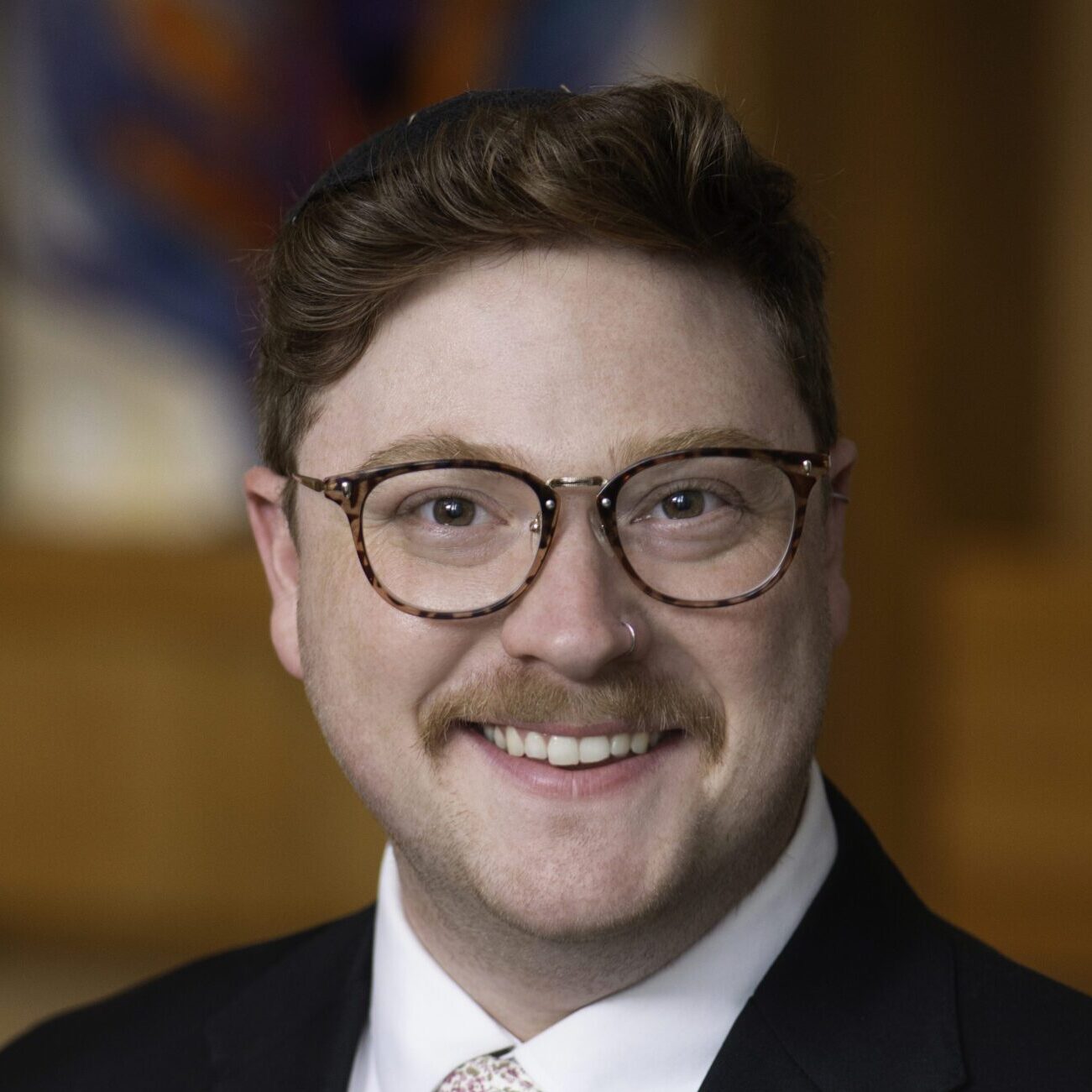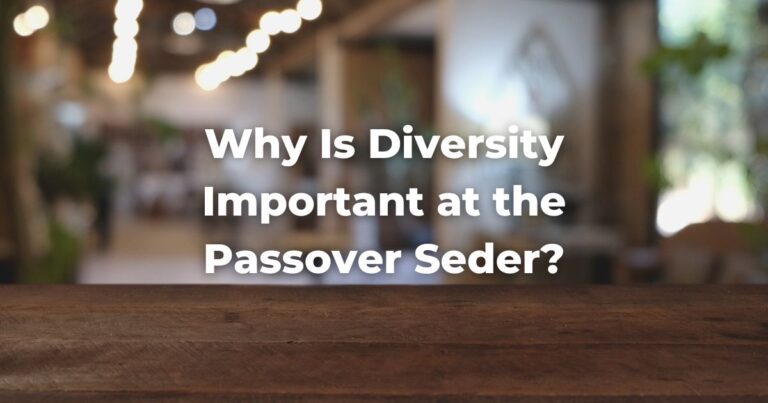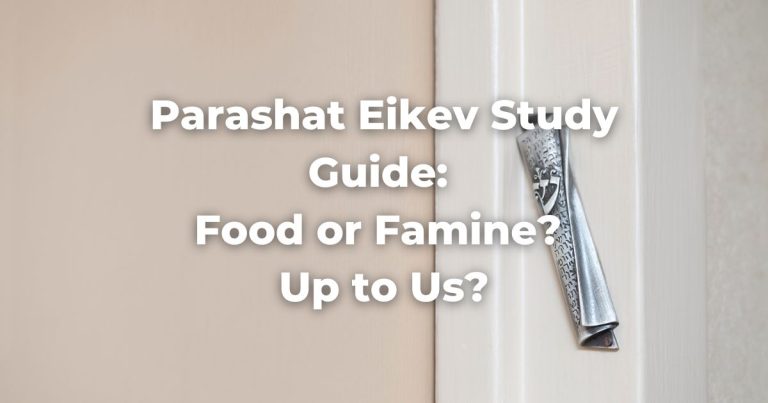Throughout my time here at JTS, the thing I’ve done that I’m the most proud of is that I taught myself the siddur.
The morning of my rabbinical school interview I was in this very room at a cold February shacharit. The wind howled and the heating was, of course, broken, and the vastness of my unknowing hung over me as I inexpertly wrapped my tallit around my head. After the Amidah, everyone in the room simultaneously sat down and did this [tachanun] and I was like … “What is going on?”
So I faked it as well as I could and went down for tachanun on the wrong arm. But I resolved that I would not enter rabbinical school liturgically clueless.
Two weeks later, the pandemic hit.
And I began the process of wringing every ounce of stability out of this book. I would stand on our tiny balcony in Chicago for two hours each morning, and again in the afternoon and evening, and read the Hebrew aloud to myself.
It took forever. My Hebrew was bad. And paragraph by paragraph, I read through the English so I knew what I was saying. Day after day and week after week I stood there and learned the words that my ancestors have used for generations to pray to God.
I learned the language our people use to approach the Divine.
Over the first year of the pandemic, when so much was wave-tossed and adrift, I anchored myself to the siddur. In the middle of a thunderous tempest, I found a quiet solace, and it was these quiet moments that laid the groundwork for the rabbi I am becoming.
But there is very little quietude in Parshat Vayishlach.
Wracked with anxious guilt, Ya’akov—Jacob—sets in motion an elaborate parade of gifts to try and appease his justifiably estranged brother Esav. That night, Ya’akov wrestles with an enigmatic divine being and is rewarded for his partial victory with a new name—Yisrael, Israel.
The brothers reunite with love despite continued tensions and then go their separate ways. Dinah, Ya’akov’s only daughter is raped, and her older brothers Shimon and Levi carry out an enormous, vengeful massacre. Finally, we hear of the deaths of our ancestors Leah and Yitzchak.
It is a challenging, overwhelming, tempestuous parsha. So I’m not going to talk about any of those things. In this stormy sedra, I’m committed to giving voice to the quiet moments of personal prayer. We zoom in on Ya’akov, deep in thought on the banks of the Jordan.
וַיִּירָ֧א יַעֲקֹ֛ב מְאֹ֖ד וַיֵּ֣צֶר ל֑וֹ…
“Ya’akov was greatly frightened, and in his anxiety (Genesis 32:8),” he divided his family and his belongings into two camps to make them harder to attack.
We can imagine Ya’akov pacing back and forth on the banks of the Jordan, just one restless, wrestling sleep away from facing his angry brother. Suddenly, his voice pierces the anxious silence:
וַיֹּ֘אמֶר֮ יַעֲקֹב֒ אֱלֹהֵי֙ אָבִ֣י אַבְרָהָ֔ם וֵאלֹהֵ֖י אָבִ֣י יִצְחָ֑ק ה׳ הָאֹמֵ֣ר אֵלַ֗י שׁ֧וּב לְאַרְצְךָ֛ וּלְמוֹלַדְתְּךָ֖ וְאֵיטִ֥יבָה עִמָּֽךְ׃ (Genesis 32:10)
“God of my father Avraham, God of my father Yitzchak, HASHEM! The One who said to me ‘return to your land and to your birthplace and I will be good to you …”
קטֹנְתּי … I am too small, unworthy of all the kindness that You have shown Your servant: with my staff alone I crossed this Jordan, and now I have become two rich camps.
… הַצִּילֵ֥נִי נָ֛א מִיַּ֥ד אָחִ֖י מִיַּ֣ד עֵשָׂ֑ו כִּֽי־יָרֵ֤א אָנֹכִי֙
“Deliver me, I pray, from the hand of my brother, from the hand of Esav. I am scared.”
…וְאַתָּ֣ה אָמַ֔רְתָּ הֵיטֵ֥ב אֵיטִ֖יב עִמָּ֑ךְ
This is a perfect prayer: (1) Ya’akov addresses God grandly, (2) then humbles himself, (3) then credits God with his own wealth, (4) then makes a specific request, and (5) then he couches that request in a previous divine promise. Beautiful. And there’s a reason this structure may feel intuitive and familiar. The classical medieval commentator Sforno points out:
הקדים בסדר שבחי המקום וחסדיו ובהזכיר זכות אבות כסדר אנשי כנסת הגדולה בתחלת י”ח ברכות
Ya’akov started with praise of God and God’s kindness, and recalled the merits of his forebears just like the Great Rabbinic Assembly did when they invented the Amidah!
(1) Address God grandly: Baruch Ata HaShem, Eloheinu v’Elohei Avoteinu. Elohei Avraham, Elohei Yitzchak, and then we go on: You are so awesome, God. Wow. So mighty. So powerful. So unfathomably holy. (2) Humility: Nobody is anywhere close to Your level. (3) Give God credit: I can’t even take credit for my own human intellect! That’s all you. (4) Specific request: Do you think, maybe, we could have some rain? (5) Reminder: To be fair, you did kiiiiiind of promise us rain.
There’s something extremely powerful about this structure of t’filah.
That’s why the Great Assembly used it to formulate the Amidah and it’s why we still use it today. The words our ancestors have been using for generations to pray to God? They’re quoting an even earlier ancestor: Jacob. “Elohei avi Avraham, Elohei avi Yitzchak, El Elyon.”
It is the structure, the keva, the fixed attributes of prayer that make the individual petitions so powerful. Ya’akov could have come in at step 4, the specific request: “hatzileini na—deliver me!” But he realized that a structured t’filah is more effective. The keva is the canvas upon which we paint our particular petitions, the piano upon which we noodle and improvise and practice and find our voice. T’filah is the metronome that beats out the rhythm of my day, and it is a reminder to take a drum solo.
But there’s a problem. A major design flaw that’s gummed up the works since I embarked on this prayerful journey five years ago.
I am not Ya’akov Avinu. A number of commentators laud Ya’akov’s bitachon, his certainty that God will indeed deliver him. But unlike Ya’akov, I have not been privy to direct, immediate, personal interaction with God.
Maybe you think I’m gonna tell you that you just gotta have faith; that with patience, drive, and a little bit of bitachon, you’ll take three steps back and three steps forwards and be standing directly in front of the kisei haKavod, the Throne of Glory for a personal audience with the Lord of Hosts, Ruler of Rulers, the Holy One Blessed be God.
But I wouldn’t be a very good rabbi if I said that. My father often quotes his father as saying this: God does, in fact, answer every single prayer. It’s just that usually, the answer is “no.”
It’s funny because it’s true. For five years I have stood in prayer three times a day and used the language and patterns of prayer as a canvas or piano or diving board or any number of apt metaphors. I don’t know how many hours and minutes I have poured out my heart to God and I have never, ever, heard God speak back.
So many quiet moments, and only my own voice to fill them. I have grown so accustomed to making meaning of reciting the words of our traditional liturgy that I’m only now taking stock enough to realize that none of my prayers have been answered. I daven the bakashot, the thirteen petitions of the weekday Amidah, with as much intention as I can muster and yet…
- My intellect fails me.
- I make incomplete amends.
- I seldom forgive myself.
- The world stands unredeemed.
- I have friends, family, and teachers who remain seriously ill.
- People lack ample sustenance.
- The Jewish people remain physically separated and ideologically disparate.
- Judges judge unjustly.
- Our haters abound.
- Righteous people are afflicted.
- Jerusalem stands at a breaking point.
- Mashiach tarries yet.
- And if my prayers are heard at all, the answer to so many of them is: No
Isn’t it interesting that I’ve been asking God for the same things every day for years on end and the answer is still “no?” Why can’t I be more like Ya’akov? He utters one prayer in this special formula and all of a sudden he’s home free.
Or is he?
Ya’akov intones this prayer at the banks of the Jordan and this time, God says nothing.
In the very next pasuk, Ya’akov jumps into action. He gathers a reconciliation gift for his brother. Then he prepares his family for come-what-may and takes them to the other side of the river. Then he literally wrestles with God in such a profound way that his name and identity and body are forever changed. And further still, when he sees Esav from afar he bows, and bows, and bows, seven times until they are face to face. And only then בס״ד when his long-lost brother falls weeping on his neck does Ya’akov realize that his prayer Hatzileini na has been answered. He has been delivered.
Let’s learn from this. Let’s learn from this that God is not a vending machine into which we insert prayer and expect things in return. We are partners with God in the realization of our prayers. Like Ya’akov, we must answer “yes” to our own t’filot so that God may do the same.
Ya’akov’s prayer does not end when he stops speaking. He makes action a part of the keva. It’s the keva, our fixed liturgy, that has been so moving and spiritually grounding in my life; saying the words day after day even and especially when I don’t feel them.
It’s insistent: God and God of my ancestors, God of my teachers. God of my friends. We are not strong enough to do this without you. God, renew in us the action it takes to answer our own prayers.
May we say “chonen ha-da’at” and then let us go and study. May we say “rofeh cholei amo Yisrael” and may we pay a hospital visit. May we address You as the “melech ohev tz’daka u’mishpat” and may we hold our judges to account. May we say “boneh Yerushalayim” and may we stand arm in arm for a Jerusalem that is holy and upright and free for all people.
God and God of our ancestors, let’s bring mashiach together! Let’s learn from Ya’akov that when it feels like our prayer goes unanswered, God is not saying “no.” God is saying “work with me.”
The next time God does speak to Ya’akov is after all the tempestuous events of the parsha.
וַיֵּרָא אֱלֹהִים אֶל–יַעֲקֹב עוֹד
“God appeared to Ya’akov again.”
Rashi says:
פַּעַם שֵׁנִי בַּמָּקוֹם הַזֶּה, אֶחָד בְּלֶכְתּוֹ וְאֶחָד בְּשׁוּבוֹ:
The second time at this same place, once when he set out and once when he returned. Rashi has picked up on the fact that these t’filot, these interactions with God were different. One t’filah before taking action and another afterwards. And at the second instance, God is there. It is difficult to liturgically codify the actions we should take to realize our own t’filot, but if we take a page out of Ya’akov’s book—Ya’akov’s siddur—then we’ll realize that action was part of the keva the entire time. And it’s our job to spend the time each day looking for it.
As we move through our stormy world, may we always find a quiet solace in the words of our ancestors. And may we find the courage, then, to jump back into the fray and back them up.
Author
-

Caleb Brommer (he/him/his) is the rabbi of Temple Beth-El in Ithaca, NY. He came to the rabbinate through the world of Jewish education and is committed to learning and sharing a living TorahRefers to the first five books of the Hebrew Bible, the Tanakh, also called the Five Books of Moses, Pentateuch or the Hebrew equivalent, Humash. This is also called the Written Torah. The term may also refer to teachings that expound on Jewish tradition. Read more. Caleb centers a rigorous, reflective, reverent, and revolutionary approach to Jewish tradition, and strives towards a world where we are all committed to one another, to humanity, to the earth, and to the Divine. He is invested in developing Jewish devotional practices of prayer, song, text learning, language learning, and community organizing. However, his primary concern is providing spiritual and pastoral care for his community.
View all posts https://izzunbooks.com/products/arukh-lakol-birkon






